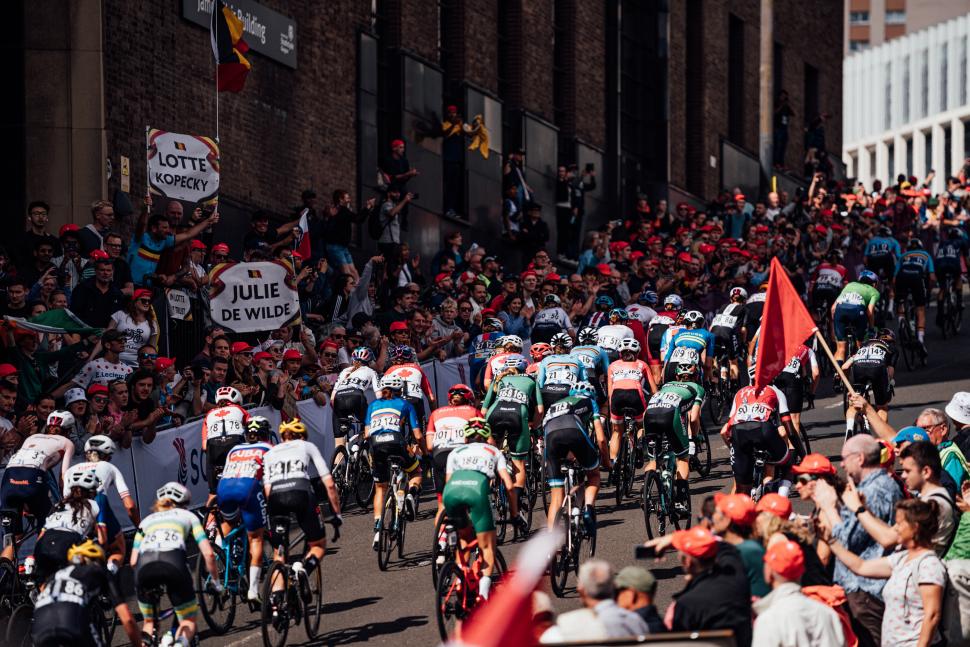World
Total cost of hosting Glasgow World Championships to exceed budget by 20% as reports claim Scottish Government spent £9 million to improve cycling facilities

The final figures for the total amount spent on the 2023 UCI World Championships held in Glasgow are expected to exceed the budget by almost 20% to reach a total of “at least £63 million”, with reports suggesting that the Scottish Government will have to pay a share of almost £40 million, exceeding the figure of £30 million it had initially committed for the event.
In August last year, Glasgow — along with key locations such as Stirling, Perth, Edinburgh, Angus, Dundee, and more — played host to the UCI World Championships, a first-of-its-kind event that brought together 13 cycling disciplines and over 200 events under the same umbrella to feature an 11-day extravaganza, regarded as the biggest event in cycling history.
But almost a year later, the total amount spent to organise the event is yet to reach a conclusive figure, with The Scotsman reporting that it is set to top £60 million, with almost £40 million coming from the Scottish Government and £16 million from the Glasgow Council, the rest being made up by UK Sport, British Cycling and host local authorities, as well as from commercial revenue streams and sponsorship.
It’s also suggested that this is on top of the £9 million that was spent to improve cycling infrastructure and bring the roads up to par for being able to host the championships.
The event was described as a “roaring success” by Scottish culture secretary Angus Robertson, with fans claiming that the atmosphere mirrored that of the Tour de France. In fact, the success was so significant that Scotland Cycling’s chief executive said that they hope to bring the Tour to Scotland on the back of the Worlds.
However, the news about increased costs has emerged as the government’s own arts agency currently faces a £47.4m shortfall to meet demand from festivals, venues and organisations.
Arts industry leaders recently told First Minister John Swinney that the funding environment is “extremely precarious” with the prospect of “devastating” decisions for organisations in October unless the promised additional funding is “brought forward at both the levels and pace that are needed”.
The First Minister was also warned by the “Culture Counts” collective that Scotland’s reputation and ambitions as an “international cultural leader” are being put at “serious risk” after 13 years of “erosion” of culture budgets.
Robertson, meanwhile, had previously told the culture committee that a combination of “increased costs, including inflation” were the primary reasons for the surpassed budget.
In February, an independent report by accounting firm Ernst & Young, which conducted extensive research into the event’s economic impact, social contribution, and sustainability, found that the world championships were attended across Scotland by just over one million spectators, with Sunday 6 August – the day of the men’s road race, won by Mathieu van der Poel – attracting 356,000 fans to the road and trackside.
Over half (52 per cent) of spectators said they were likely to increase their use of active travel after attending the worlds, while 55 per cent of those watching the racing who previously didn’t ride a bike claim to have been inspired to take up cycling. 79 per cent of Scottish spectators, meanwhile, said they were inspired to cycle more often thanks to the worlds.
Meanwhile, visitors spent £220m during their time in Scotland, while the total fulltime equivalent employment (FTE) supported by the event included 5,285 jobs in Scotland, 3,312 jobs in Glasgow and 5,878 jobs in the UK. The Gross Value Added (GVA) economic impact for Scotland also amounted to £205m, and £129m for Glasgow.
> UCI Cycling World Championships generated nearly £2 million for Dumfries and Galloway economy
A spokeswoman for Cycling World Championships Ltd said it was not possible to give a final figure for the cost of the event until all contracts had been closed.
She added: “The total cost for hosting the 2023 UCI Cycling World Championships will be around £60 million. The inaugural event has already reported delivering significant social, economic and environmental benefits including £205m in economic impact for Scotland.
“The event was broadcast in 130 countries with around 200 million hours watched live on television over 11 days.
“Funding for the event was through contributions from the Scottish Government, Glasgow City Council, UK Sport, British Cycling and host Local Authorities, as well as from commercial revenue streams and sponsorship.”
> How was it having the Cycling World Championships in my home town?
A spokesman for the government said: “The original budget for the 2023 UCI Cycling World Championships was £50m, with the Scottish Government funding contributing £30m. These figures were, however, set before significant macro-economic challenges, most notably inflationary pressures.
“The cost of hosting the event, which has already been reported as delivering significant social, economic and environmental benefits, is still being finalised but is now estimated at around £60 million.”
“Scottish ministers have increased culture sector funding by £15.8m to almost £200m this financial year, as the first step to investing at least £100m more annually in culture and the arts by 2028/29.”
Previously, The Scotsman was criticised by cyclists for publishing a comment piece, branding the World Championships as a “ridiculous decision” and a “vanity project”. It claimed that other services and budgets have been slashed and suggested that now “Scottish taxpayers will have to foot the bill” for it being over budget.




